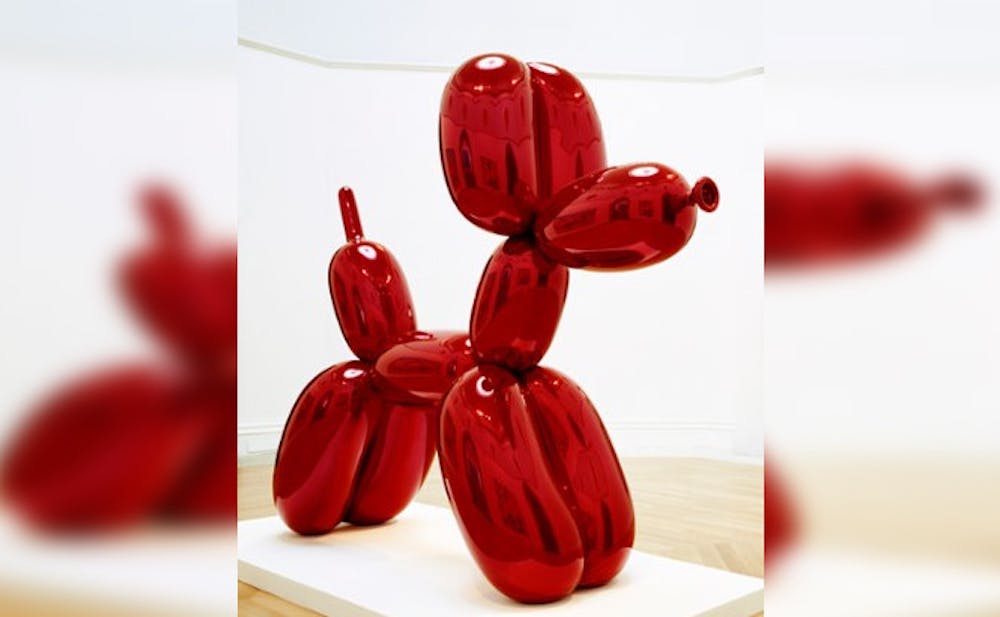Sculpture artist Jeff Koons will participate in a panel discussion at 4 p.m. Nov. 5 in IU’s Fine Arts Building. The Sidney and Lois Eskenazi Museum of Art announced the event, titled “At the Intersection of Art and Technology: A Conversation with Jeff Koons,” will feature Koons and two IU professors.
Koons, whose art often draws from popular culture, will discuss his practice and personal journey at the panel.
“We’re grateful to Jeff Koons for his willingness to share his professional journey with our students,” Peg Faimon, founding dean of the Eskenazi School said in an IU press release. “As an artist who has always embraced technology and been attuned to market forces, Koons’s insights will complement the spirit of innovation and professional savvy we foster among the artists, designers and retail leaders of the future.”
Koons, a Pennsylvania native, lives in New York City. He earned a BFA from Maryland Institute College of Art in 1976 and also studied at the School of the Art Institute of Chicago. His work, such as Balloon Dog and Rabbit, is featured in galleries around the world.
“I consider him to be one of the artists who has defined art, contemporary art, over the last twenty years,” David Brenneman, the Wilma E. Kelley director at the Eskenazi Museum of Art, said.
Brenneman has served at the Eskenazi Museum since 2015. He leads the museum’s curatorial team and directs worldwide partnerships. For him, the idea for a discussion with Koons developed quickly. Brenneman and a colleague visited with Koons in the spring and asked if he would visit IU. Koons agreed to the idea.
Koons is a controversial and surprising artist, Brenneman said. Koons’s practice and style receives much criticism. He said he is excited for the Bloomington community and IU students to hear from the artist directly.
“He plays with materials and with our expectations of what art should be,” Brenneman said. “He does it in such a way that, for some people, they find it engaging, they find it amusing and they find it deep.”
Brenneman will serve as the panel’s emcee and said the discussion will explore Koons’s interest in technology and art, particularly art’s ability to connect.
David Crandall, professor and director of the Luddy Center for Artificial Intelligence, and Caleb Weintraub, associate professor at the Eskenazi School of Art, Architecture and Design will serve as additional panelists in Koons’s discussion.
Crandall serves as the director of the IU Computer Vision Lab. The lab’s research focuses on computer vision and data mining, which includes analyzing large amounts of data. Many of his students work for companies like Facebook, Google and Blackmagic Design.
Weintraub teaches painting and drawing at the Eskenazi School and serves as the school’s director of undergraduate studies.
“I think it’s a good opportunity to hear from one of the world’s most impactful living artists,” he said.
Weintraub said he is curious to hear Koons unpack the ideas behind his work, explain his process and discuss how he thinks about technology in the arts. He also wants to know how Koons feels his work fits into culture.
“A lot of people project ideas onto his work,” Weintraub said. “Much of my interaction with his work is in my own head, and I’m curious to hear him talk more about his process.”
Weintraub co-ran a symposium at IU called Creativity in the Age of AI and taught a course about AI and his studio practice. He said he plans to teach the course again next year.
“My use of technology is more as a tool, like an augmentation,” he said. “I use a lot of AI as a brainstorming device and a conversational device for hashing out ideas … My own practice is very traditional. I still use material. Even though I have digital processes in my thinking and in my sketch practice, the ultimate results are very much hand made.”
Some of Weintraub’s former students have worked under Koons. That connection paired with Weintraub’s interest in art and technology made him a natural fit for the panel.
“We’re mostly hoping to hear his thoughts,” he said. “We’ll have prepared questions, but we’re not interested in our thoughts. We’re just interested in hearing him.”
The discussion is free to attend, but reservations are required and space is limited. It will be livestreamed for those unable to attend.
To reserve a seat and find more information, visit the Eskenazi Museum of Art’s calendar.




